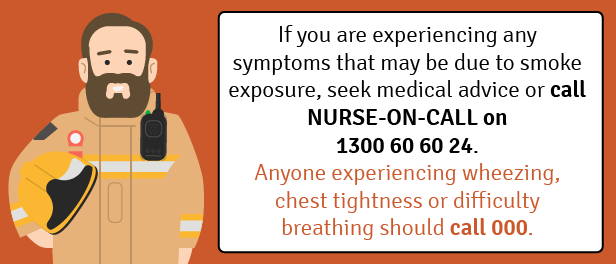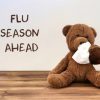Why is smoke bad for your health?
Smoke is a mixture of particles, water vapour and gases. But fine particles called PM2.5 are the biggest health concern.
Fine particles can cause some short- or long-term effects on your respiratory or cardiovascular systems. These microscopic particles can be breathed deep into your respiratory system and lodge in your lungs. Breathing these fine particles deeply into the lungs can cause breathing problems and worsen pre-existing medical conditions such as asthma and heart disease.
How smoke exposure affects you depends on your age, pre-existing medical conditions, and the length of time you are exposed to the smoke.
Children (up to 14), adults over 65, smokers, pregnant women, and people with a heart or lung condition are more sensitive to the effects of breathing in smoke. Their symptoms can be worse at lower smoke concentrations compared to other people.
Signs of short term smoke irritation such as itchy eyes, sore throat, runny nose and coughing usually clear up in healthy adults once you’re away from the smoke.
Take action

How to check air quality in your local area
The Environment Protection Authority (EPA) is responsible for providing information and advice on air quality from fires. You can find information about air quality in your local area on the EPA AirWatch or visit VicEmergency for information on fires near you.
How to protect your health from smoke
There are simple steps you can take to avoid smoke and protect your health.
- If you are not under threat from a fire, avoid breathing smoke by staying inside with the windows and doors closed.
- Reduce physical activity.
- People with pre-existing heart or lung conditions, including asthmatics, should take their medication, follow their treatment plan and seek immediate medical advice if symptoms such as breathing issues, wheezing or tightness in the chest persist.
- Keep the air inside your home as healthy as possible. If you have an air conditioner, switch it to ‘recirculate’ or ‘re-use’ and reduce activities that affect indoor air quality, like smoking cigarettes, burning candles or vacuuming.
- If your home is uncomfortable, take a break by visiting a friend or relative away from the smoke or visit an air-conditioned centre, like a library, shopping centre or cinema. Check that it’s safe to go elsewhere before leaving.
- When there’s a break in the smoke, open your windows and doors to get rid of any smoke inside the house.
- Look out for kids, older people, and other people at risk.
- If you are experiencing any symptoms that may be due to smoke exposure, seek medical advice or call NURSE-ON-CALL on 1300 60 60 24.
- Anyone experiencing wheezing, chest tightness and difficulty breathing should call 000.
Information from https://www.betterhealth.vic.gov.au/





